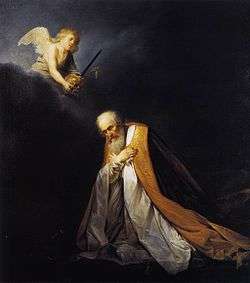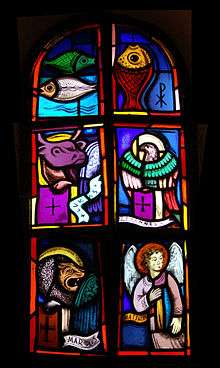David
| David | |
|---|---|
| King of Israel | |
 Statue of King David by Nicolas Cordier in the Borghese Chapel of the Basilica di Santa Maria Maggiore | |
| Reign |
c. 1010 – 1002 BCE (Judah only) c. 1002 – 970 BCE (Israel)[1] |
| Predecessor |
Saul Ish-bosheth |
| Successor | Solomon |
| Born |
c. 1040 BCE Bethlehem, Judah, Israel |
| Died |
c. 970 BCE (aged 69 or 70) Jerusalem, Judah, Israel |
| Burial | City of David |
| Consort |
Michal Ahinoam Abigail Maachah Haggith Abital Eglah Bathsheba |
| Issue |
Amnon Chileab Absalom Adonijah Shephatiah Ithream Shammua Shobab Nathan Solomon Ibhar Elishua Nepheg Japhia Elishama Eliada Eliphalet Tamar |
| House | House of David |
| Father | Jesse |
| Mother | Nitzevet (Talmud) |
David (/ˈdeɪvɪd/; Hebrew: דָּוִד, Modern David, Tiberian Dāwîḏ; ISO 259-3 Dawid; Ancient Greek: Δαυίδ; Latin: Davidus, David), according to the Hebrew Bible, was the second king of the united Kingdom of Israel and Judah, reigning in c. 1010–970 BCE.[2]
Depicted as a valorous warrior of great renown, and a poet and musician credited for composing many of the psalms contained in the Book of Psalms, King David is viewed in biblical sources as a righteous and effective king in battle and civil and criminal justice. He is described as a man after God's own heart in 1 Samuel 13:14 and Acts 13:22.
According to the New Testament, he was an ancestor of Jesus.[3]
Biblical account

God is angered when Saul, Israel's king, unlawfully offers a sacrifice[4] and later disobeys a divine instruction to utterly destroy the Amalekites.[5] Consequently, he sends the prophet Samuel to anoint David, the youngest son of Jesse of Bethlehem, to be king instead.[6]
God sends an evil spirit to torment Saul. Saul's courtiers recommend that he send for David, a man skillful on the lyre, wise in speech, and brave in battle. So David enters Saul's service as one of the royal armour-bearers, and plays the lyre to soothe the king whenever the evil spirit is upon him.[7]
War comes between Israel and the Philistines, and the giant Goliath challenges the Israelites to send out a champion to face him in single combat.[8] David, sent by his father to bring provisions to his brothers serving in Saul's army, declares that he can defeat Goliath.[9] Refusing the king's offer of the royal armour,[10] he kills Goliath with his sling.[11] Saul inquires the name of the young hero.[12]
Saul sets David over his army. All Israel loves David, but his popularity causes Saul to fear him ("What else can he wish but the kingdom?").[13] Saul plots his death, but Saul's son Jonathan, one of those who loves David, warns him of his father's schemes and David flees. He becomes a vassal of the Philistine king Achish of Gath, but Achish's nobles question his loyalty,[14] and he is left behind to guard the camp when the Philistines march against Saul.[15] Jonathan and Saul are killed,[16] and David is anointed king over Judah.[17] In the north, Saul's son Ish-Bosheth is anointed king of Israel, and war ensues until Ish-Bosheth is murdered.[18]
With the death of Saul's son, the elders of Israel come to Hebron and David is anointed king over all Israel.[19] He conquers Jerusalem, previously a Jebusite stronghold, and makes it his capital.[20] He brings the Ark of the Covenant to the city,[21] intending to build a temple for God, but the prophet Nathan forbids it, prophesying that the temple would be built by one of his sons.[22] Nathan also prophesies that God has made a covenant with the house of David: "Your throne shall be established forever."[23] David wins more victories over the Philistines, while the Moabites, Edomites, Amalekites, Ammonites and Aramean king Hadadezer of Zobah pay tribute after being defeated.[24]
During a battle to conquer the Ammonite capital of Rabbah, David seduces Bathsheba[25] and causes the death of her husband Uriah the Hittite.[26] In response, Nathan prophesies the punishment that shall fall upon him: "the sword shall never depart from your house."[27] In fulfillment of these words David's son Absalom rebels.[28] The rebellion ends at the battle of the Wood of Ephraim. Absalom's forces are routed, and Absalom is caught by his long hair in the branches of a tree, and killed by Joab, contrary to Davids order. Joab was the commander of David's army.[29] David laments the death of his favourite son: "O my son Absalom, my son, my son Absalom! Would I had died instead of you, O Absalom, my son, my son!"[30] When David is old and bedridden, Adonijah, his eldest surviving son and natural heir, declares himself king.[31] Bathsheba and Nathan go to David and obtain his agreement to crown Bathsheba's son Solomon as king, according to David's earlier promise, and the revolt of Adonijah is put down.[32] David dies at the age of 70 after reigning 40 years,[33] and on his deathbed counsels Solomon to walk in the ways of God and to take revenge on his enemies.[34]
Family
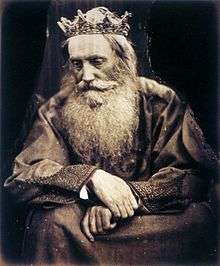
1 Samuel makes David the youngest of the eight sons of Jesse of Bethlehem. His mother is not named in any book of the Bible, but the Talmud identifies her as Nitzevet daughter of Adael.[35] When the story was retold in 1 Chronicles (4th century BCE) he was made the youngest of seven sons and given two sisters, Zeruiah and Abigail. The Book of Ruth (possibly also 4th century BCE) traces his ancestry back to Ruth the Moabite.
David cemented his relations with various political and national groups through marriage.[36] He had eight wives: Michal, the second daughter of King Saul; Ahinoam the Jezreelite; Abigail the Carmelite, previously wife of Nabal; Maachah, daughter of Talmai, king of Geshur; Haggith; Abital; Eglah; and Bathsheba.
The Book of Chronicles lists his sons by various wives and concubines. In Hebron, David had six sons: Amnon, by Ahinoam; Daniel, by Abigail; Absalom, by Maachah; Adonijah, by Haggith; Shephatiah, by Abital; and Ithream, by Eglah.[37] By Bathsheba, his sons were Shammua, Shobab, Nathan and Solomon. David's sons born in Jerusalem by other wives included Ibhar, Elishua, Eliphelet, Nogah, Nepheg, Japhia, Elishama and Eliada.[38] Jerimoth, who is not mentioned in any of the genealogies, is mentioned as another of his sons in 2 Chronicles 11:18. His daughter Tamar, by Maachah, is a key character in the incident of her rape by one of her half-brothers.
David in history, archeology and literature
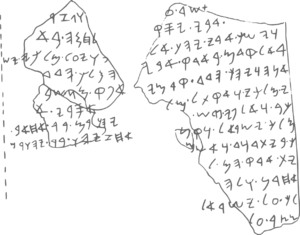
The Tel Dan Stele, an inscribed stone erected by a king of Damascus in the late 9th/early 8th centuries BCE to commemorate his victory over two enemy kings, contains the phrase ביתדוד, bytdwd, which most scholars translate as "House of David".[39] Other scholars have challenged this reading,[40] but it is likely that this is a reference to a dynasty of the Kingdom of Judah which traced its ancestry to a founder named David.[39] The Mesha Stele from Moab, dating from approximately the same period, may also contain the name David in two places, although this is less certain than the mention in the Tel Dan inscription.[41]
Apart from these, all that is known of David comes from the biblical literature. The Books of Samuel were substantially composed during the time of King Josiah at the end of the 7th century, extended during the Babylonian exile (6th century), and substantially complete by about 550 BCE, although further editing was done even after then – the silver quarter-shekel which Saul's servant offers to Samuel in 1 Samuel 9 "almost certainly fixes the date of the story in the Persian or Hellenistic period".[42] The authors and editors of Samuel drew on many earlier sources, including, for their history of David, the "history of David's rise" (1 Samuel 16:14-2 Samuel 5:10), and the "succession narrative" (2 Samuel 9–20 and 1 Kings 1–2).[43] The Book of Chronicles, which tells the story from a different point of view, was probably composed in the period 350–300 BCE, and uses Samuel as its source.[44]
The authors and editors of Samuel and Chronicles did not aim to record history, but to promote David's reign as inevitable and desirable, and for this reason there is little about David that is concrete and undisputed.[45] The archaeological evidence indicates that in the 10th century, the time of David, Judah was sparsely inhabited and Jerusalem was no more than a small village; over the following century it slowly evolved from a highland chiefdom to a kingdom, but always overshadowed by the older and more powerful kingdom of Israel to the north.[46] The Biblical evidence likewise indicates that David's Judah was something less than a full-fledged monarchy: it often calls him negid, for example, meaning "prince" or "chief", rather than melek, meaning "king"; the Biblical David sets up none of the complex bureaucracy that a kingdom needs (even his army is made up of volunteers), and his followers are largely related to him and from his small home-area around Hebron.[47]
Beyond this, the full range of possible interpretations is available. The late John Bright, in his History of Israel (1981), takes Samuel at face value. Donald B. Redford, however, sees all reconstructions from biblical sources for the United Monarchy period as examples of "academic wishful thinking".[48] Thomas L. Thompson rejects the historicity of the biblical narrative: "The history of Palestine and of its peoples is very different from the Bible's narratives, whatever political claims to the contrary may be. An independent history of Judea during the Iron I and Iron II periods has little room for historicizing readings of the stories of I-II Samuel and I Kings."[49] Amihai Mazar however, concludes that based on recent archeological findings, like those in City of David, Khirbet Qeiyafa, Tel Dan, Tel Rehov, Khirbet en-Nahas and others "the deconstruction of United Monarchy and the devaluation of Judah as a state in 9th century is unacceptable interpretation of available historic data". According to Mazar, based on archeological evidences, the United Monarchy can be described as a "state in development".[50]
Some studies of David have been written: Baruch Halpern has pictured David as a lifelong vassal of Achish, the Philistine king of Gath;[51] Israel Finkelstein and Neil Asher Silberman have identified as the oldest and most reliable section of Samuel those chapters which describe David as the charismatic leader of a band of outlaws who captures Jerusalem and makes it his capital.[52] Steven McKenzie, Associate Professor of the Hebrew Bible at Rhodes College and author of King David: A Biography, states the belief that David actually came from a wealthy family, was "ambitious and ruthless" and a tyrant who murdered his opponents, including his own sons.[53]

Critical Bible scholarship holds that the biblical account of David's rise to power is a political apology—an answer to contemporary charges against him, of his involvement in murders and regicide.[54]
Israel Finkelstein and Neil Asher Silberman reject the idea that David ruled over a united monarchy, suggesting instead that he ruled only as a chieftain over the southern kingdom of Judah, much smaller than the northern kingdom of Israel at that time.[55] They posit that Israel and Judah were still polytheistic in the time of David and Solomon, and that much later seventh-century redactors sought to portray a past golden age of a united, monotheistic monarchy in order to serve contemporary needs.[56] They note a lack of archeological evidence for David's military campaigns and a relative underdevelopment of Jerusalem, the capital of Judah, compared to a more developed and urbanized Samaria, capital of Israel.[57][58][59]
Jacob L. Wright, Associate Professor of Hebrew Bible at Emory University, has written that the most popular legends about David, including his killing of Goliath, his affair with Bathsheba, and his ruling of a United Kingdom of Israel rather than just Judah, are the creation of those who lived generations after him, in particular those living in the late Persian or Hellenistic periods.[60]
David as Psalmist
_(14596056419).jpg)
While almost half of the Psalms are headed "A Psalm of David" (though the phrase can also be translated as "to David" or "for David") and tradition identifies several with specific events in David’s life (e.g., Psalms 3, 7, 18, 34, 51, 52, 54, 56, 57, 59, 60, 63 and 142),[61] the headings are late additions and no psalm can be attributed to David with certainty.[53]
Psalm 34 is attributed to David on the occasion of his escape from the Abimelech (king) Achish by pretending to be insane.[62] According to the narrative in 1 Samuel 21, instead of killing the man who had exacted so many casualties from him, Abimelech allows David to depart, exclaiming, "Am I so short of madmen that you have to bring this fellow here to carry on like this in front of me? Must this man come into my house?"[63]
Rabbinic Judaism
David is an important figure in Rabbinic Judaism. Many legends have grown around the figure of David. According to one Rabbinic tradition, David was raised as the son of his father Jesse and spent his early years herding his father's sheep in the wilderness while his brothers were in school.
David's adultery with Bathsheba was only an opportunity to demonstrate the power of repentance, and the Talmud states that it was not adultery at all, quoting a Jewish practice of divorce on the eve of battle. Furthermore, according to Talmudic sources, the death of Uriah was not to be considered murder, on the basis that Uriah had committed a capital offense by refusing to obey a direct command from the King.[64] However, in tractate Sanhedrin, David expressed remorse over his transgressions and sought forgiveness. God ultimately forgave David and Bathsheba but would not remove their sins from Scripture.[65]
According to midrashim, Adam gave up 70 years of his life for the life of David.[66] Also, according to the Talmud Yerushalmi, David was born and died on the Jewish holiday of Shavuot (Feast of Weeks). His piety was said to be so great that his prayers could bring down things from Heaven.
Christianity
| King David the Prophet | |
|---|---|
|
King David in Prayer, by Pieter de Grebber (c. 1640) | |
| Holy Monarch, Prophet, Reformer, Spiritual Poet & Musician, Vicegerent of God, Psalm-Receiver | |
| Born |
c. 1040 BCE Bethlehem |
| Died |
c. 970 BCE Jerusalem |
| Venerated in |
Judaism Christianity Islam |
| Feast | December 29 - Roman Catholicism |
| Attributes | Psalms, Harp, Head of Goliath |
The concept of the Messiah is important in Christianity. Originally an earthly king ruling by divine appointment ("the anointed one", as the title Messiah had it), the "son of David" became in the last two pre-Christian centuries the apocalyptic and heavenly one who would deliver Israel and usher in a new kingdom. This was the background to the concept of Messiahship in early Christianity, which interpreted the career of Jesus "by means of the titles and functions assigned to David in the mysticism of the Zion cult, in which he served as priest-king and in which he was the mediator between God and man".[67] The early Church believed that "the life of David [foreshadowed] the life of Christ; Bethlehem is the birthplace of both; the shepherd life of David points out Christ, the Good Shepherd; the five stones chosen to slay Goliath are typical of the five wounds; the betrayal by his trusted counsellor, Achitophel, and the passage over the Cedron remind us of Christ's Sacred Passion. Many of the Davidic Psalms, as we learn from the New Testament, are clearly typical of the future Messiah."[68] In the Middle Ages, "Charlemagne thought of himself, and was viewed by his court scholars, as a 'new David'. [This was] not in itself a new idea, but [one whose] content and significance were greatly enlarged by him".[69] The linking of David to earthly kingship was reflected in later Medieval cathedral windows all over Europe through the device of the Tree of Jesse, its branches demonstrating how divine kingship descended from Jesse, through his son David, to Jesus.
Western Rite churches (Lutheran, Roman Catholic) celebrate his feast day on 29 December, Eastern-rite on 19 December.[70] The Eastern Orthodox Church and Eastern Catholic Churches celebrate the feast day of the "Holy Righteous Prophet and King David" on the Sunday of the Holy Forefathers (two Sundays before the Great Feast of the Nativity of the Lord), when he is commemorated together with other ancestors of Jesus. He is also commemorated on the Sunday after the Nativity, together with Joseph and James, the Brother of the Lord.
Middle Ages
_(Historical).svg.png)
In European Christian culture of the Middle Ages, David was made a member of the Nine Worthies, a group of heroes encapsulating all the ideal qualities of chivalry. His life was thus proposed as a valuable subject for study by those aspiring to chivalric status. This aspect of David in the Nine Worthies was popularised firstly through literature, and was thereafter adopted as a frequent subject for painters and sculptors.
David was considered as a model ruler and a symbol of the God-ordained monarchy throughout medieval Western Europe and Eastern Christendom. David was perceived as the biblical predecessor to Christian Roman and Byzantine emperors and the name "New David" was used as an honorific reference to these rulers.[72] The Georgian Bagratids and the Solomonic dynasty of Ethiopia claimed a direct biological descent from him.[73] Likewise, the Frankish Carolingian dynasty frequently connected themselves to David; Charlemagne himself occasionally used the name of David as his pseudonym.[72]
Islam
David (Arabic داود, Dāwūd) is a highly important figure in Islam as one of the major prophets sent by God to guide the Israelites. David is mentioned several times in the Quran, often with his son Solomon. The actual Arabic equivalent to the Hebrew Davīd is Dawūd. In the Qur'an: David killed Goliath (2:251), a giant soldier in the Philistine army. When David killed Goliath, God granted him kingship and wisdom and enforced it (38:20). David was made God's "vicegerent on earth" (38:26) and God further gave David sound judgment (21:78; 37:21–24, 26) as well as the Psalms, regarded as books of divine wisdom (4:163; 17:55). The birds and mountains united with David in uttering praise to God (21:79; 34:10; 38:18), while God made iron soft for David (34:10), God also instructed David in the art of fashioning chain-mail out of iron (21:80); an indication of the first use of Wrought iron, this knowledge gave David a major advantage over his bronze and cast iron-armed opponents, not to mention the cultural and economic impact. Together with Solomon, David gave judgment in a case of damage to the fields (21:78) and David judged the matter between two disputants in his prayer chamber (38:21–23). Since there is no mention in the Qur'an of the wrong David did to Uriah nor any reference to Bathsheba, Muslims reject this narrative.[74]
Muslim tradition and the hadith stress David's zeal in daily prayer as well as in fasting.[75] Qur'an commentators, historians and compilers of the numerous Stories of the Prophets elaborate upon David's concise Qur'anic narratives and specifically mention David's gift in singing his Psalms as well as his musical and vocal talents. His voice is described as having had a captivating power, weaving its influence not only over man but over all beasts and nature, who would unite with him to praise God.[76]
Modern art and literature
Literature
Literary works about David include:
- 1681-82 Dryden's long poem Absalom and Achitophel is an allegory that uses the story of the rebellion of Absalom against King David as the basis for his satire of the contemporary political situation, including events such as the Monmouth Rebellion (1685), the Popish Plot (1678) and the Exclusion Crisis.
- 1893 Sir Arthur Conan Doyle used the story of David and Bathsheba as the main structure for the Sherlock Holmes story The Adventure of the Crooked Man. The betrayal of the Crooked Man is paralleled with David's betrayal of Uriah the Hittite, carried out in order to win Bathsheba.
- 1928 Elmer Davis's novel Giant Killer retells and embellishes the Biblical story of David, casting David as primarily a poet who managed always to find others to do the "dirty work" of heroism and kingship. In the novel, Elhanan in fact killed Goliath but David claimed the credit; and Joab, David's cousin and general, took it upon himself to make many of the difficult decisions of war and statecraft when David vacillated or wrote poetry instead.
- 1936 William Faulkner's Absalom, Absalom! refers to the story of Absalom, David's son; his rebellion against his father and his death at the hands of David's general, Joab. In addition it parallels Absalom's vengeance for the rape of his sister Tamar by his half-brother, Amnon.
- 1939 In Agatha Christie's novel/play And Then There Were None (also known as Ten Little Indians), one character compares his own predicament to the story of David and Uriah.
- 1941 In Frans G. Bengtsson's historical novel The Long Ships, a Christian missionary is hosted by the early Danish King Harald Bluetooth and his son Sweyn Forkbeard and recounts to them the life of King David including the story of Absalom's rebellion - a sensitive subject since the Danish King suspects his own son of intending to launch a rebellion.
- 1946 Gladys Schmitt's novel David the King was a richly embellished biography of David's entire life. The book took a risk, especially for its time, in portraying David's relationship with Jonathan as overtly homoerotic, but was ultimately panned by critics as a bland rendition of the title character.
- 1966 Juan Bosch, a Dominican political leader and writer, wrote David: Biography of a King, as a realistic portrayal of David's life and political career.
- 1970 Dan Jacobson's The Rape of Tamar is an imagined account, by one of David's courtiers Yonadab, of the rape of Tamar by Amnon.
- 1972 Stefan Heym wrote The King David Report in which the historian Ethan compiles upon King Solomon's orders "a true and authoritative report on the life of David, Son of Jesse" - the East German writer's wry depiction of a court historian writing an "authorized" history, many incidents clearly intended as satirical references to the writer's own time.
- 1974 In Thomas Burnett Swann's Biblical fantasy novel How are the Mighty Fallen, David and Jonathan are explicitly stated to be lovers. Moreover, Jonathan is a member of a winged semi-human race (possibly nephilim), one of several such races coexisting with humanity but often persecuted by it.
- 1980 Malachi Martin's factional novel King of Kings: A Novel of the Life of David relates the life of David, Adonai's champion in his battle with the Philistine deity Dagon.
- 1984 Joseph Heller wrote a novel based on David called God Knows, published by Simon & Schuster. Told from the perspective of an aging David, the humanity—rather than the heroism—of various biblical characters is emphasized. The portrayal of David as a man of flaws such as greed, lust, selfishness, and his alienation from God, the falling apart of his family is a distinctly 20th-century interpretation of the events told in the Bible.
- 1993 Madeleine L'Engle's novel Certain Women explores family, the Christian faith, and the nature of God through the story of King David's family and an analogous modern family's saga.
- 1995 Allan Massie wrote King David, a novel about David's career that portrays the king's relationship to Jonathan as sexual.[77]
- 2007, 2010 "Occupation Duty," a short alternate history story by Harry Turtledove, published in Time Twisters, (eds. Jean Rabe and Martin H. Greenberg), and in Atlantis and Other Places, is set in modern times in a world in which Goliath defeated David, resulting in the state of "Philistinia" having the same function in that world as the State of Israel has in ours.
- 2015 Pulitzer Prize-winning author Geraldine Brooks published a novel about King David, The Secret Chord.[78]
- 2016 New York Times-Bestselling Author Eric Shaw Quinn published a novel about King David, The Prince's Psalm with a special emphasis on the passionate love and devotion between the youthful David and Jonathan, Crown Prince of Israel and son of King Saul. Their friendship and developing love forge both men into legends, while the enmity of the Royal Court, jealous wives, or King Saul himself can keep the purity and intrinsic love they feel from expressing itself in war, peace, or even death.
Film
David has been depicted several times in films; these are some of the best-known:
- 1917 In The Chosen Prince, directed by William V. Mong
- 1951 In David and Bathsheba, directed by Henry King, Gregory Peck played David.
- 1959 In Solomon and Sheba, directed by King Vidor, Finlay Currie played an aged King David.
- 1961 In A Story of David, directed by Bob McNaught, Jeff Chandler played David.
- 1985 In King David, directed by Bruce Beresford, Richard Gere played King David. (This film was poorly received by critics and failed at the box office.)
- 1996 In Dave and the Giant Pickle
- 1997 In Bible Collection
- 2016 In Of Kings and Prophets
Music
- 14th/15th century Josquin des Prez's Planxit autem, David is a polyphonic setting of 2 Samuel, chapter one verses 17–27, David's lamentation for the dead Saul and Jonathan. His Absalon fili mi is a polyphonic lamentation from David's perspective on the death of his son.
- 1738 George Frideric Handel's oratorio Saul features David as one of its main characters.[79]
- 1921 Arthur Honegger's oratorio Le Roi David with a libretto by Rene Morax, instantly became a staple of the choral repertoire.
- 1984 Flash of the Blade by Iron Maiden mentions David in the line "You're St. George or you're David and you always killed the beast".
- 1984 Leonard Cohen's song Hallelujah has references to David ("there was a secret chord that David played and it pleased the Lord", "The baffled king composing Hallelujah") and Bathsheba ("you saw her bathing on the roof") in its opening verses.
- 1989 The Pixies' song Dead on Doolittle is a retelling of David's adultery and repentance.
- 1990 The song One of the Broken by Paddy McAloon, performed by Prefab Sprout on the album Jordan: The Comeback, has a reference to David ("I remember King David, with his harp and his beautiful, beautiful songs, I answered his prayers, and showed him a place where his music belongs").
- 1991 Mad About You, a song on Sting's the album The Soul Cages, explores David's obsession with Bathsheba from David's perspective.
- 1999 Eric Whitacre composed a choral piece, "When David Heard", chronicling the death of Absalom and David's grief over losing his son.
- 2000 The song Gimme a Stone appears on the Little Feat album Chinese Work Songs chronicles the duel with Goliath and contains a lament to Absalom as a bridge.
- 2009 The Angel of Death Came to David's Room by MewithoutYou is in reference to King David.
- 2011 Your Heart by Chris Tomlin on Music inspired by The Story is a prayer of David.
Musical theater
- 1997 King David, a modern oratorio, with a book and lyrics by Tim Rice and music by Alan Menken.
Television
- 1995 The episode "Little Big Dog" of the PBS series Wishbone recounts the story of David, his favor with Saul, and his triumphant battle over Goliath.
- The season two episode of Xena: Warrior Princess called "Giant Killer" features David and his killing of Goliath.
- 1996 In Series 2, Episode 7 of the science fiction show Dominion, titled "Lay Thee Before Kings," David is shown slaying Goliath with the unwitting support of the Archangels Gabriel and Michael.
- 1997 TV film David, with Nathaniel Parker portraying King David.
- 1997 Max von Sydow portrayed an older King David in the TV film Solomon, a sequel to David.
- 2009 The NBC series Kings, explicitly designed as a modern retelling of the David story.
- 2013 Langley Kirkwood portrayed King David in the miniseries The Bible produced by Mark Burnett and Roma Downey.
Playing cards
For a considerable period, starting in the 15th century and continuing until the 19th, French playing card manufacturers assigned to each of the court cards names taken from history or mythology.[80][81] In this context, the King of Spades was often known as "David".
Image gallery
-
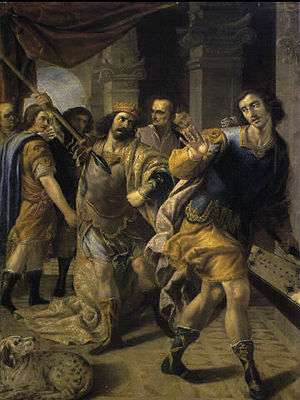
José Leonardo: Saul threatening David.
-

Miniature from the Paris Psalter: David in the robes of a Byzantine emperor.
-
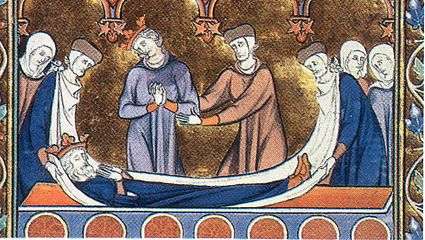
Medieval manuscript: The funeral of King David.
-
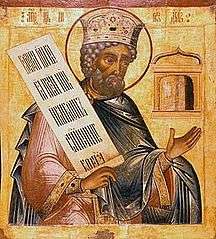
Russian icon, iconostasis of Kizhi monastery, 18th century: St. David, Prophet and King.
-
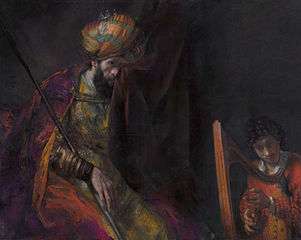
Rembrandt, c. 1650: Saul and David.
See also
- David in Islam
- Large Stone Structure
- David's Tomb
- David's Mighty Warriors
- Midrash Shmuel (aggadah)
- Kings of Israel and Judah
- Davidic line
- David and Jonathan
References
Citations
- ↑ Carr, David M. & Conway, Colleen M., An Introduction to the Bible: Sacred Texts and Imperial Contexts, John Wiley & Sons (2010), p. 58
- ↑ Halpern 2000, p. 318.
- ↑ Matthew 1:1-17, Mark 10:46-48, Luke 3:23-38, Romans 1:1-4, 2 Timothy 2:8, Revelation 22:16
- ↑ 1 Sam 13:8-14
- ↑ 1 Sam 15:1-28
- ↑ 1 Sam 16:1-13
- ↑ 1 Sam 16:14-23
- ↑ 1 Sam 17:1-11
- ↑ 1 Sam 17:17-37
- ↑ 1 Sam 17:38-39
- ↑ 1 Sam 17:49-50
- ↑ 1 Sam 17:55-56
- ↑ 1 Sam 18:5-9
- ↑ 1 Sam 21:10-11
- ↑ 1 Sam 29:1-11
- ↑ 1 Sam 31:1-13
- ↑ 2 Sam 2:1-4
- ↑ 2 Sam 2:8-11
- ↑ 2 Sam 5:1-3
- ↑ 2 Sam 5:6-7
- ↑ 2 Sam 6:1-12
- ↑ 2 Sam 7:1-13
- ↑ 2 Sam 7:16
- ↑ 2 Sam 8:1-14
- ↑ 2 Sam 11:2-5
- ↑ 2 Sam 11:14-17
- ↑ 2 Sam 12:8-10
- ↑ 2 Sam 15:1-12
- ↑ 2 Sam 18:1-15
- ↑ 2 Sam 18:33
- ↑ 1 Kings 1:1-5
- ↑ 1 Kings 1:11-31
- ↑ 2 Sam 5:4
- ↑ 1 Kings 2:1-9
- ↑ Talmud Tractate Bava Batra 91a
- ↑ Lemaire, Andre. in Ancient Israel, (Hershel Shanks, ed.), Biblical Archaeology Society; Revised edition (1999), ISBN 978-1880317549
- ↑ 1 Chronicles 3:1–3
- ↑ 2 Samuel 5:14–16
- 1 2 Pioske 2015, p. 180.
- ↑ Pioske, Daniel (2015-02-11). "4: David's Jerusalem: The Early 10th Century BCE Part I: An Agrarian Community". David's Jerusalem: Between Memory and History. Routledge Studies in Religion. 45. Routledge (published 2015). p. 180. ISBN 9781317548911. Retrieved 2016-09-17.
[...] the reading of bytdwd as "House of David" has been challenged by those unconvinced of the inscription's allusion to an eponymous David or the kingdom of Judah.
- ↑ Pioske 2015, p. 210,fn.18.
- ↑ Auld 2003, p. 219.
- ↑ Knight 1991, p. 853.
- ↑ McKenzie 2004, p. 32.
- ↑ Moore & Kelle 2011, p. 232-233.
- ↑ Finkelstein & Silberman 2007, p. 26-27.
- ↑ Moore & Kelle 2011, p. 220-221.
- ↑ Donald B. Redford, Egypt, Canaan, and Israel in Ancient Times, Princeton University Press, 1992 pp.301–307, p.301.
- ↑ Thompson TL. "A view from Copenhagen: Israel and the History of Palestine".
- ↑ Mazar A. Archaeology and the Biblical Narrative: The Case of the United Monarchy (PDF).
- ↑ Baruch Halpern, "David's Secret Demons", 2001.Review of Baruch Halpern's "David's Secret Demons".
- ↑ Finkelstein and Silberman, "David and Solomon", 2006. See review "Archaeology" magazine.
- 1 2 Steven McKenzie, Associate Professor Rhodes College, Memphis, Tennessee.
- ↑ Baden, Joel (2014-07-29). The Historical David: The Real Life of an Invented Hero. HarperCollins Publishers. ISBN 9780062188373.
- ↑ Finkelstein, Israel; Silberman, Neil Asher (2002) [2001]. "8. In the Shadow of Empire (842-720 BCE)". The Bible Unearthed. Archaeology's New Vision of Ancient Israel and The Origin of Its Sacred Texts (First Touchstone Edition 2002 ed.). New York: Touchstone. pp. 189–190. ISBN 978-0-684-86913-1.
Archaeologically and historically, the redating of these cities from Solomon's era to the time of Omrides has enormous implication. It removes the only archeological evidence that there was ever a united monarchy based in Jerusalem and suggests that David and Solomon were, in political terms, little more than hill country chieftains, whose administrative reach remained on a fairly local level, restricted to the hill country.
- ↑ Israel Finkelstein; Neil Asher Silberman (6 March 2002). The Bible Unearthed: Archaeology's New Vision of Ancient Israel and the Origin of Sacred Texts. Simon and Schuster. p. 23. ISBN 978-0-7432-2338-6.
the narrative of the Bible was uniquely suited to further the religious reform and territorial ambitions of Judah.
- ↑ Israel Finkelstein; Neil Asher Silberman (6 March 2002). The Bible Unearthed: Archaeology's New Vision of Ancient Israel and the Origin of Sacred Texts. Simon and Schuster. p. 158. ISBN 978-0-7432-2338-6.
we still have no hard archaeological evidence--despite the unparalleled biblical description of its grandeur--that Jerusalem was anything more than a modest highland village in the time of David, Solomon, and Rehoboam.
- ↑ "Table Two" (Finklestein and Silberman, 2002: 131).
- ↑ Speaking of Samaria: "The scale of this project was enormous." (Finkelstein and Silberman 2002: 181).
- ↑ "The Bible and Interpretation". bibleinterp.com.
- ↑ Commentary on II Samuel 22, The Anchor Bible, Vol. 9. II Samuel. P. Kyle McCarter, Jr., 1984. New York: Doubleday. ISBN 0-385-06808-5
- ↑ Psalm 34, Interlinear NIV Hebrew-English Old Testament. Kohlenberger, J.R, 1987. Grand Rapids, Michigan:Zondervan Publishing House ISBN 0-310-40200-X
- ↑ 1 Samuel 21:15
- ↑ "DAVID - JewishEncyclopedia.com". jewishencyclopedia.com.
- ↑ Babylonian Talmud, Tractate Sanhedrin. pp. 107a.
- ↑ Zohar Bereishis 91b
- ↑ "David" article from Encyclopædia Britannica Online
- ↑ John Corbett (1911) King David The Catholic Encyclopedia (New York: Robert Appleton Company)
- ↑ McManners, John. The Oxford Illustrated History of Christianity. p. 101.
- ↑ Saint of the Day for December 29 at St. Patrick Catholic Church, Washington, D.C.
- ↑ Lindsay of the Mount, Sir David (1542). Lindsay of the Mount Roll.
- 1 2 Garipzanov, Ildar H. The Symbolic Language of Royal Authority in the Carolingian World (c.751-877). BRILL. pp. 128, 225. ISBN 9004166696.
- ↑ Rapp, Stephen H., Jr. (1997). Imagining history at the crossroads: Persia, Byzantium, and the architects of the written Georgian past. Ph.D. dissertation, University of Michigan. p. 528.
- ↑ A-Z of Prophets in Islam and Judaism, Wheeler, David
- ↑ Encyclopedia of Islam, Dawud
- ↑ Stories of the Prophets, Ibn Kathir, Story of David
- ↑ O'Kane, Martin (1999). "The Biblical King David and His Artistic and Literary Afterlives". In Exum, Jo Cheryl. Beyond the Biblical Horizon: The Bible and the Arts. p. 86. ISBN 9004112901. Retrieved 15 August 2015.
- ↑ Gilbert, Matthew (3 October 2015). "'The Secret Chord' by Geraldine Brooks". Boston Globe. Retrieved 4 October 2015.
- ↑ "G. F. Handel's Compositions". The Handel Institute. Retrieved 28 September 2013.
- ↑ "snopes.com: Four Kings in Deck of Cards". snopes.com.
- ↑ "Courts on playing cards", by David Madore, with illustrations of the Anglo-American and French court cards
Bibliography
- Auld, Graeme (2003). "1 & 2 Samuel". In James D. G. Dunn and John William Rogerson. Eerdmans Commentary on the Bible. Eerdmans. ISBN 9780802837110.
- Bergen, David T. (1996). 1, 2 Samuel. B&H Publishing Group. ISBN 9780805401073.
- Brettler, Mark Zvi (2007). "Introduction to the Historical Books". In Coogan, Michael David; Brettler, Marc Zvi; Newsom, Carol Ann. The New Oxford Annotated Bible with the Apocryphal/Deuterocanonical Books. Oxford University Press. ISBN 9780195288803.
- Coogan, Michael David (2007). "Cultural Contexts: The Ancient Near East and Israel". In Coogan, Michael David; Brettler, Marc Zvi; Newsom, Carol Ann. The New Oxford Annotated Bible with the Apocryphal/Deuterocanonical Books. Oxford University Press. ISBN 9780195288803.
- Finkelstein, Israel; Silberman, Neil Asher (2007). David and Solomon: In Search of the Bible's Sacred Kings and the Roots of the Western Tradition. Simon and Schuster. ISBN 9780743243636.
- Gordon, Robert (1986). I & II Samuel, A Commentary. Paternoster Press. ISBN 9780310230229.
- Halpern, Baruch (2000). "David". In Freedman, David Noel; Allen C., Myers. Eerdmans Dictionary of the Bible. Eerdmans. ISBN 9789053565032.
- Kirsch, Jonathan (2000) King David: the real life of the man who ruled Israel. Ballantine. ISBN 0-345-43275-4.
- Dever, William G. (2001) What did the Bible writers know and when did they know it? William B. Eerdmans Publ. Co., Cambridge UK.
- Hertzberg, Hans Wilhelm (1964). I & II Samuel, A Commentary (trans. from German 1960 2nd ed.). Westminster John Knox Press. ISBN 9780664223182.
- Tsumura, David Toshio (2007). The First book of Samuel. Eerdmans. ISBN 9780802823595.
- Breytenbach, Andries (2000). "Who Is Behind The Samuel Narrative?". In Johannes Cornelis de Moor and H.F. Van Rooy. Past, present, future: the Deuteronomistic history and the prophets. Brill. ISBN 9004118713.
- Coogan, Michael D. (2009) A Brief Introduction to the Old Testament: the Hebrew Bible in its Context Oxford University Press
- Dick, Michael B (2004). "The History of "David's Rise to Power" and the Neo-Babylonian Succession Apologies". In Bernard Frank Batto and Kathryn L. Roberts. David and Zion: biblical studies in honor of J.J.M. Roberts. Eisenbrauns. ISBN 9781575060927.
- Eynikel, Erik (2000). "The Relation Between the Eli Narrative and the Ark Narratives". In Johannes Cornelis de Moor and H.F. Van Rooy. Past, present, future: the Deuteronomistic history and the prophets. Brill. ISBN 9004118713.
- Halpern, Baruch (2001). David's secret demons: messiah, murderer, traitor, king. Eerdmans. ISBN 9780802827975.
- Jones, Gwilym H (2001). "1 and 2 Samuel". In John Barton and John Muddiman. The Oxford Bible Commentary. Oxford University Press. ISBN 9780198755005.
- Klein, R.W. (2003). "Samuel, books of". In Bromiley, Geoffrey W. The international standard Bible encyclopedia. Eerdmans. ISBN 9780802837844.
- Knight, Douglas A (1995). "Deuteronomy and the Deuteronomists". In James Luther Mays, David L. Petersen and Kent Harold Richards. Old Testament Interpretation. T&T Clark. ISBN 9780567292896.
- Knight, Douglas A (1991). "Sources". In Watson E. Mills, Roger Aubrey Bullard. Mercer Dictionary of the Bible. Mercer University Press. ISBN 9780865543737.
- McKenzie, Steven L. (2004). Abingdon Old Testament Commentaries: I & II Chronicles. Abingdon Press.
- Moore, Megan Bishop; Kelle, Brad E. (2011). Biblical History and Israel's Past. Eerdmans. ISBN 978-0-8028-6260-0.
- Pioski, Daniel (2015). David's Jerusalem: Between Memory and History. Routledge.
- Pfoh, Emanuel (2016). The Emergence of Israel in Ancient Palestine: Historical and Anthropological Perspectives. Routledge.
- Rosner, Steven (2012). A Guide to the Psalms of David. Outskirts Press.
- Schleffer, Eben (2000). "Saving Saul from the Deuteronomist". In Johannes Cornelis de Moor and H.F. Van Rooy. Past, present, future: the Deuteronomistic history and the prophets. Brill.
- Soggin, Alberto (1987). Introduction to the Old Testament. Westminster John Knox Press.
- Spieckerman, Hermann (2001). "The Deuteronomistic History". In Leo G. Perdue. The Blackwell companion to the Hebrew Bible. Blackwell.
- Van Seters, John (1997). In search of history: historiography in the ancient world and the origins of biblical history. Eisenbrauns.
- Walton, John H (2009). "The Deuteronomistic History". In Andrew E. Hill, John H. Walton. A Survey of the Old Testament. Zondervan.
Further reading
- Alexander, David; Alexander, Pat, eds. (1983). Eerdmans' handbook to the Bible ([New, rev.]. ed.). Grand Rapids, Mich.: Eerdmans. ISBN 0-8028-3486-8.
- Bright, John (1981). A history of Israel (3rd ed.). Philadelphia: Westminster Press. ISBN 0-664-21381-2.
- Bruce, F. F. (1963). Israel and the Nations. Grand Rapids, MI: Eerdmans.
- Harrison, R.K. (1969). An Introduction to the Old Testament. Grand Rapids, MI: Eerdmans.
- Kidner, Derek (1973). The Psalms. Downers Grove, IL: Inter-Varsity Press. ISBN 0-87784-868-8.
- Noll, K. L. (1997). The faces of David. Sheffield: Sheffield Acad. Press. ISBN 1-85075-659-7.
- Thompson, J.A. (1986). Handbook of life in Bible times. Leicester, England: Inter-Varsity Press. ISBN 0-87784-949-8.
- Green, Adam (2007). King Saul, The True History of the First Messiah. Cambridge, UK: Lutterworth Press. ISBN 0718830741.
External links
![]() Media related to David at Wikimedia Commons
Media related to David at Wikimedia Commons
![]() Quotations related to David at Wikiquote
Quotations related to David at Wikiquote
- Complete Bible Genealogy David's family tree
- David engravings from the De Verda collection
- King David at the Christian Iconography web site
- The History of David, by William Caxton
| David of the United Kingdom of Israel & Judah Cadet branch of the Tribe of Judah | ||
| Regnal titles | ||
|---|---|---|
| New title Rebellion from Israel under Ish-bosheth |
King of Judah 1010 BC–1003 BC |
Succeeded by Solomon |
| Preceded by Ish-bosheth |
King of the United Kingdom of Israel and Judah 1003 BC–970 BC | |
